Hitting the Brakes on Animal Research: Why Targeting Transport Companies Is Key

Animal research is big business. Those who poison and mutilate nonhumans to death under the guise of science usually wear lab coats, but researchers are only part of the picture: They’re propped up by an elaborate, profit-driven network of breeders, universities, feed suppliers, restraint manufacturers, veterinarians, pharmaceutical moguls, private security companies and law enforcement. The scale of it is mind-numbing.
With an infrastructure so robust, one might expect a slew of well-staffed companies that specialize in moving animals. Streamlined delivery round the clock, right?
Not exactly.
The vivisection industry’s transportation infrastructure is easily one of its weakest links. Thanks to activist pressure and the international Gateway to Hell campaign—as well as our own efforts locally—what was once a rolodex brimming with commercial airlines willing to fly animals to labs has since dwindled to one or two offenders. A side effect of this progress, in the case of nonhuman primates, has been the costly construction of more breeding facilities stateside. Another is an increased reliance on domestic trucking companies for getting animals from point A to point B.
Unfortunately for animal abusers, the pickings are slim. Recently published documents show that Primate Products, one of the country’s biggest monkey suppliers, relied exclusively on two trucking companies for hauling monkeys in 2015. Like other go-to animal transporters in the US, these are small, family-run operations employing less than a dozen people. Think about that. The future of vivisection in this country largely hinges on a handful of private trucking fleets—some of which are small enough to fit in their owner’s backyard!

Still not seeing how targeting a trucking business might save animals? Ted Wasky can help. Once the Global Director of Security at Harlan and Envigo, Ted has traveled the world dedicating presentations to the threat posed by activists protesting the transport sector. He sums it up nicely:
“This is a quite common, very well recognized and easily successful military type of campaign. If you cut off the service and supply lines to an army, and in this case an industry, you will be able to shut down their operations. And it is having a dramatic effect on the ability to move around animals necessary for animal research.”
Below are three companies that have hauled animals for vivisection in recent years. If you live near one, do some research. Talk with local activists. Leaflet the surrounding community. Set up a protest. Start a campaign. Follow through. In an industry this sensitive, a little bit of sustained pressure in the right place can help bring animal experiments to a screeching halt.
Frame’s Animal Transportation*
1119 Haverford Road
Ridley Park, PA 19078
JKL Secure Freight Lines
5200 Us Highway 50 East
Carson City, NV 89701
Barr Scientific Transport
857 James Taylor Dr
Ridgeland, SC 29936
*The fight against Frame’s has already begun! If you live in or around PA and want to get involved, we strongly recommend supporting the Break Frame’s campaign.

2 thoughts on “Hitting the Brakes on Animal Research: Why Targeting Transport Companies Is Key”